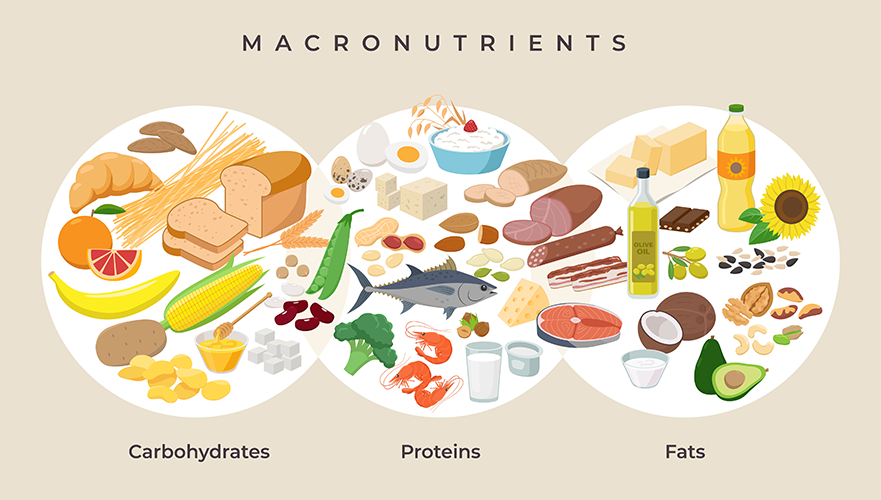A Look at Macronutirents
The health and fitness world is rife with non-evidenced based recommendations and buzzwords. If you are a regular gym-goer or follow any health and fitness blogs or social media, you’ve undoubtedly come across the term “macros” countless times. Understanding macronutrients, what they are, and how they are relevant to your weight management and health goals, is one of the fundamental principles of nutrition. If you have hit a plateau or want to take your health and fitness to the next level, counting “macros” may be the next step. Your Prime Meridian Healthcare provider can help you develop a macro counting nutrition plan that works for you.

What Is a Macronutrient?
Macronutrients are the components of food that our bodies need for energy and to function properly. On the other hand, micronutrients are the individual vitamins and minerals that do not provide energy, but that we need in smaller amounts for optimal health and function. You should be aware of the three categories of macronutrients and their primary functions:

CARBOHYDRATES
1g = 4kcals
Provide energy for physical activity.
Protein sparing (provides energy so muscle mass is not catabolized).
Fuel body systems and organs, such as the nervous system (your brain).

PROTEIN
1g = 4kcals
Grow and repair tissue (organs, muscles, tendons, ligaments, hair, nails, skin, etc.).
Part of cell membranes.
Involved in metabolism and hormones.
Compose enzymes involved in metabolism.
Help regulate neutral (acid/base) balance within the body.

FAT
1g = 9kcals
Storage of energy.
Organ protection.
Transportation of (fat soluble) vitamins.
Insulation.
Calories are important, as they reflect how much energy is contained within our food, but they only represent a piece of the puzzle—especially if you are concerned about weight management. Creating a calorie deficit is necessary to lose weight, but with less overall intake there is an increased risk that you are not meeting your body’s macronutrient needs and further tracking may be necessary to optimize overall health.
Counting Macros
Tracking macros takes calorie counting a step further and may help you make better food choices and progress towards your goals. Losing (or purposely gaining) weight is dependent on balancing energy in (energy consumed) vs. energy out (energy used), but it does have its deficiencies. Calories are an indicator of the amount of energy that a food contains, not the amount of nutrition. So, if you are looking to take your body composition and health to the next level, understanding macronutrients and nutrient density (amount of nutrition per unit of energy) is vitally important. If you already have your calorie tracking in order, counting macronutrients can help you balance energy and specific nutrition needs.

You may want to consider tracking your macronutrients if:
Your weight management has plateaued despite maintaining a caloric deficit.
You are making progress towards your weight management goals, but feel sluggish, are not fully recovering from exercise, or otherwise suspect you may have a macronutrient or micronutrient deficiency.
You have a specific performance goal that may require more energy (carbohydrates) or tissue-repairing protein.
Benefits of Tracking Macronutrient Intake
For those who may be in one of these situations, beginning to track macronutrients may help:
STICKING TO A SPECIFIC DIET
For a variety of reasons, many people are on specific diets that require strict adherence to certain macronutrient ratios. Whether you are attempting keto or the zone diet, or trying to gain lean muscle and therefore need a specific amount of protein, tracking your macros will help you adhere to the plan and reach your goals.
KEEP YOU ACCOUNTABLE
Similar to tracking calories, tracking macros can help keep you accountable. It’s about being mindful of what you are eating. If you are thinking about and/or writing down everything you eat, you are more likely to adhere to your plan.
IDENTIFY NUTRITIONAL IMBALANCES
You may think you are getting enough carbohydrates to maximize your energy or enough protein for recovery and growth, but you won’t know for sure until you track it. Tracking your macronutrients will help you know rather than assume.
Keep in mind, there are some possible downsides as well:
FOOD QUALITY
While tracking macronutrients is a beneficial step beyond tracking calories, just because something meets your macro requirements does not make it high quality or “healthy.” The nutrient density of your food is more important for health than hitting your macro goals.
FOOD VARIETY
Eating a wide variety of whole unprocessed food is the most direct way for your body to get all the micronutrients it needs for optimal health and function. When tracking macronutrients, it is easy to get into a routine where you are eating the same foods repeatedly because they help you meet your macro ratios. Limiting the number of foods you eat may also promote food sensitivities or intolerances (1).
DISORDERED EATING
While measuring, weighing, and tracking macronutrients can be a great way to improve health, there is a fine line between having a plan and having a disorder. Be mindful not to allow your calorie and macro counting to become an obsession and result in (or exacerbate) a disorder.
If you believe you may benefit from taking your food tracking to the next level by counting your macronutrients, discuss with your Prime Meridian Healthcare provider how to safely and conveniently do so.
Optimizing Your Ratios
To an extent, all macronutrients are necessary for optimum health. However, depending on your situation and your specific goals, how many macronutrients you need may vary significantly. Most current recommendations come from the Food and Nutrition Board of the Institutes of Medicines (IOM) (2). According to the IOM’s recommendations, obtaining 45–65% of calories from carbohydrates, 10–35% from protein, and 20–25% from fat provides a range broad enough to cover basic macronutrient needs for most active people’s situations. But, if there is any unequivocal law of nutritional science, it’s that individual responses to dietary input are unique: there is no one-size-fits-all feeding pattern or dietary method that works best for everybody. Whether or not these ranges work for you depends on many factors, including your health and eating history, your activity levels, and your goals.
Keep in mind:
-With no established minimum requirement and the increasing popularity of ketogenic and other low-carbohydrate diets, intake of carbohydrates is the most debated macronutrient (3).
-Protein needs are highly dependent on your level of physical activity and goals, and excessive intake may cause digestive distress or increase risk for kidney conditions (4, 5).
-Dietary fat does not directly raise blood sugar levels like carbohydrates do (and, to a smaller extent, protein) and may positively influence appetite (6). Due to these factors, many people do well on higher ratios of dietary fat.
HOW TO TRACK MACROS
With these factors in mind, tracking macronutrients comes down to three steps:
Determine caloric needs |
This can be done with the use of online calculators or done by hand using the Mifflin-St. Jeor equation (7).
Determine macronutrient ratios |
Using the IOM’s recommendations and your personal situation, work with a healthcare professional to determine your individual macronutrient needs.
Track |
Record your daily calorie and macronutrient intake, either manually or with the use of an app.
Understanding the calorie balance equation is the foundation of weight management, but taking your calorie counting to the next level by also tracking macronutrients can help you continue to progress or to reach goals that are more advanced. Schedule an appointment with your Prime Meridian Healthcare provider to analyze your current macronutrient needs and to develop a customized health plan.
References
1
Food Intolerances
Tuck C., et al.
4
Dietary Protein For Athletes
Phillips S. and Van Loon L.
7
Resting Metabolic Rates in Adults
Frankenfield D., et al.
2
Recommendations For Nutrition
Manore M.
5
Optimizing Protein Intake in Adults
Wolfe R., et al.
3
Dietary Carbohydrates
Ludwig D., et al.
6
Macros, Appetite, and Energy Intake
Carreiro A., et al.


